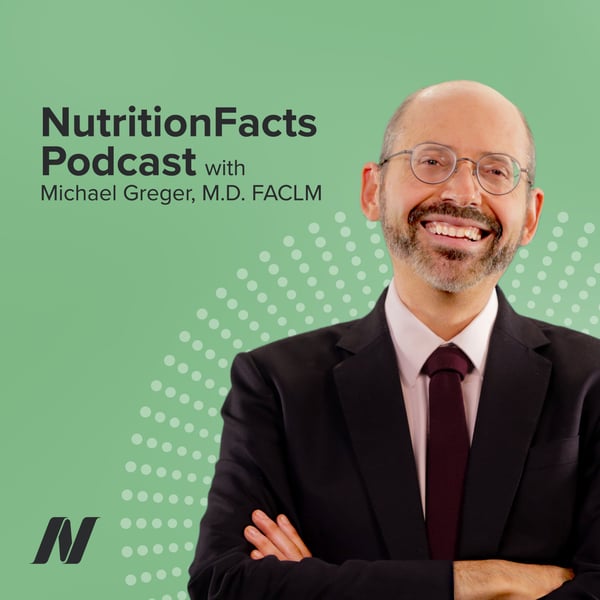Nutrition Facts Grab Bag 16
Nutrition Facts with Dr. Greger
[email protected]
4.8 • 3.6K Ratings
🗓️ 7 January 2021
⏱️ 16 minutes
🧾️ Download transcript
Summary
This episode features audio from The Role of Epigenetics in the Obesity Epidemic, Benefits of Quinoa for Lowering Triglycerides, and Are There Health Benefits of Spending Time in Nature?. Visit the video pages for all sources and doctor's notes related to this podcast.
Transcript
Click on a timestamp to play from that location
| 0:00.0 | Welcome to the Nutrition Facts Podcast. I'm your host, Dr. Michael Greger. |
| 0:05.4 | The coronavirus pandemic has made many of us very aware of the importance of maintaining and improving our health. |
| 0:13.0 | Make that your silver lining. |
| 0:16.2 | Because the more positive change we can make to our diet lifestyle, the better. |
| 0:21.0 | It's time for the Nutrition Facts at Grab Bag, where we look at the latest science on a whole variety of topics. |
| 0:27.2 | First up, there's a new story on the role of epigenetics in the obesity debate. |
| 0:33.4 | Identical twins don't just share DNA. They also share the uterus. |
| 0:38.2 | Might that also help account for some of their metabolic similarities. |
| 0:42.8 | Fatal over-nutrition, evidenced by an abnormally large birth weight, seems to be a strong predictor of obesity in childhood and later in life. |
| 0:52.6 | Could it be you are what your mom ate? A dramatic illustration from the animal world is the crossbreeding of Shetland ponies with massive draft horses. |
| 1:02.6 | I mean, either way, the offspring are half-pony, half-horse, but in the pony uterus, they come out much smaller, think heavens for the poor pony. |
| 1:12.6 | This is presumably the same reason why the mule, donkey dad and mare, is larger than the hilly, stallion and donkey mom. |
| 1:20.6 | The way you test this in people is to study the size of babies from surrogate mothers after in vitro fertilization. |
| 1:28.6 | Who do you think most determines the birth weight of a test tube baby? |
| 1:32.6 | The donor mom who provided all the DNA or the surrogate mom who provided the intra-utera environment? |
| 1:39.6 | When it was put to the test, the womb won. Incredibly. |
| 1:45.6 | A baby born to an obese surrogate mother with a skinny biological mom may harbor a greater risk of becoming obese than a baby from a big biological mom born to a slim surrogate. |
| 1:56.6 | The researchers conclude the environment provided by the mother is more important than her genetic contribution to birth weight. |
| 2:04.6 | The most compelling data comes from comparing obesity rates and siblings born to the exact same mother before and after her bariatric surgery. |
| 2:13.6 | Compared to their brothers and sisters born before the surgery, those born when mom weighed about 100 pounds less had lower rates of inflammation, |
| 2:22.6 | metabolic derangements and most critically three times less risk of developing severe obesity, afflicting 35% of those born before the weight loss compared to 11% or an after. |
| 2:34.6 | The researchers conclude these data emphasize how critical it is to prevent obesity and treat it effectively to prevent further transmission to future generations. |
... |
Please login to see the full transcript.
Disclaimer: The podcast and artwork embedded on this page are from [email protected], and are the property of its owner and not affiliated with or endorsed by Tapesearch.
Generated transcripts are the property of [email protected] and are distributed freely under the Fair Use doctrine. Transcripts generated by Tapesearch are not guaranteed to be accurate.
Copyright © Tapesearch 2025.

